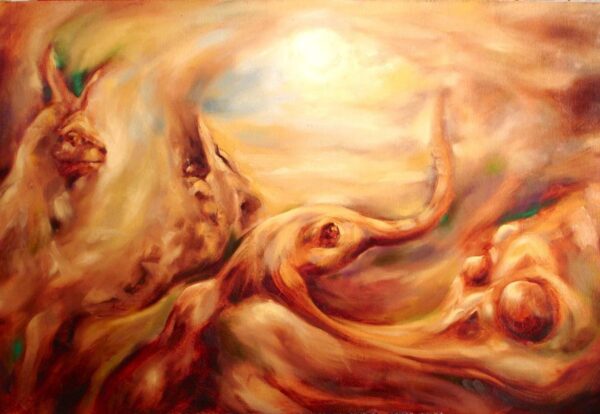Ruach HaYam teaching presented by Penina Weinberg via Zoom – May 21, 2020
[Image:“Ezekiel’s Vision” oil on masonite. By permission of Artist Nick Kokis]
We are coming up to the the holiday of Shavuot, the date which tradition tells us is the date upon which the Torah was given at Sinai. Through a study of a few short texts, we will have a conversation about the nature of revelation. We will read Ezekiel 1:1-28 and 3:12, which is the haftarah for Shavuot day 1 – the vision of the prophet Ezekiel of wheels within wheels, of a fiery mass, of a living creature with 4 heads, 4 sides, 4 wings. What is the nature of Ezekiel’s vision? How does it compare to Moses at the burning bush (Exodus 3:1-17) and to the revelation at Sinai (Exodus 19:1-20:23 is one of the Torah readings for Shavuot 1)?
We will refer to Julia Watts-Belser’s article “God on Wheels: Disability and Jewish Feminist Theology” where she writes “One recent Shavuot Ezekiel’s vision split open my own imagination. Hearing those words chanted, I felt a jolt of recognition, an intimate familiarity. I thought: God has wheels!
“In relating Ezekiel’s vision to the Sinaitic revelation, an implicit connection is made between prophecy and revelation. Ezekiel’s vision is taken to be a collective vision at Mount Sinai, where every Jew was able to see God’s presence. This implies that every Jew was a prophet and could become as great as Ezekiel… Ezekiel [chapter] 1 thus reveals what even the most common Israelite saw at Sinai on that awesome occasion. Its recitation on the first day of Shavuot calls that wondrous event to mind with numinous detail. Luminous beyond understanding, the vision in Ezekiel 1:4-28 is a sight for the inner eye.” – Micheal Fishbane https://www.myjewishlearning.com/article/why-read-ezekiel-on-shavuot/
Penina Weinberg is an independent Hebrew bible scholar whose study and teaching focus on the intersection of power, politics and gender in the Hebrew Bible. She has run workshops for Nehirim and Keshet and has been teaching Hebrew bible for 10 years. She has written in Tikkun and HBI blog, and is the leader and founder of Ruach HaYam.
*** Ruach HaYam https://www.facebook.com/groups/Ruach.HaYam/ study sessions provide a queer Jewish look at text, and are welcoming to LGBTQ+ and allies, to any learning or faith background, to all bodies, and friendly to beginners***
